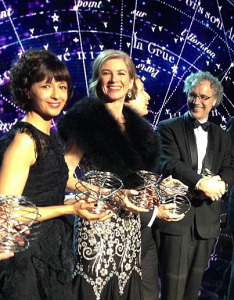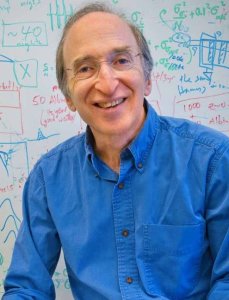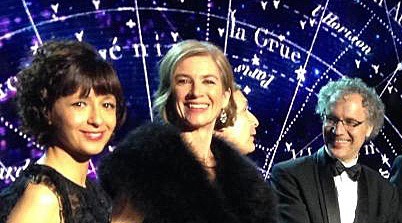
Jennifer Doudna (center) with colleague Emmanuelle Charpentier (left), newly named recipients of the 2015 Breakthrough Prize in Life Sciences. (Photo courtesy of Breakthrough Prize)
Saul Perlmutter, an astrophysicist with Berkeley Lab’s Physics Division, and Jennifer Doudna, a biochemist with Berkeley Lab’s Physical Biosciences Division, were among the featured recipients of the 2015 Breakthrough Prizes in Fundamental Physics and Life Sciences.
Billed as the “richest prize in science,” the Breakthrough Prizes were founded by Google’s Sergey Brin and Anne Wojcicki; Alibaba’s Jack Ma and Cathy Zhang; Yuri and Julia Milner; and Facebook’s Mark Zuckerberg and Priscilla Chan. The prizes are intended to recognize major insights into the deepest questions of the Universe, and honor transformative advances toward understanding living systems and extending human life, respectively. Twelve prizes in all, totaling $36 million, were announced Sunday night at a gala in Mountain View hosted by the noted entertainer (and former host of the Oscars) Seth MacFarlane.
Perlmutter, along with other members of the Supernova Cosmology Project he leads, shared the 2015 Breakthrough Prize in Fundamental Physics with the High-Z Supernova Team, for “the most unexpected discovery that the expansion of the universe is accelerating, rather than slowing as had been long assumed.” This refers to the discovery of so-called “dark energy,” a mysterious anti-gravitational force that drives the accelerating expansion of the universe, increasing the distances between galaxies, for which Perlmutter received a Nobel Prize in Physics in 2011, among other honors.
Other members of the Supernova Cosmology Project who will share the Breakthrough Prize in physics with Perlmutter are Greg Aldering, Brian Boyle, Patricia Castro, Warrick Couch, Susana Deustua, Richard Ellis, Sebastien Fabbro, Alexei Filippenko, Andrew Fruchter, Ariel Goobar, Donald Groom, Isobel Hook, Mike Irwin, Alex Kim, Matthew Kim, Robert Knop, Julia Lee, Chris Lidman, Thomas Matheson, Richard McMahon, Richard Muller, Heidi Newberg, Peter Nugent, Nelson Nunes, Reynald Pain, Nino Panagia, Carl Pennypacker, Robert Quimby, Pilar Ruiz-Lapuente, Bradley Schaefer and Nicholas Walton.

Saul Perlmutter, Nobel laureate astrophysicist and leader of the Supernova Cosmology Project. (Photo by Roy Kaltschmidt)
In a New York Times story, Perlmutter called this award a celebration of the teamwork that “brought a whole subfield’s expertise together to catch the universe in the act of once again behaving even more bizarrely than we thought possible.”
Doudna received a 2015 Breakthrough Prize in Life Sciences for “harnessing an ancient mechanism of bacterial immunity into a powerful and general technology for editing genomes, with wide-ranging implications across biology and medicine.” She shared this prize with Emmanuelle Charpentier of Sweden’s Umeå University. Doudna and Charpentier have been at the forefront of research into a genetic element known as CRISPR, which stands for Clustered Regularly Interspaced Short Palindromic Repeats. The combination of CRISPR and its associated “Cas” family of enzymes enables geneticists to precisely edit the instructions contained in a targeted genome and/or regulate the expression of the genes that are produced.
The $3 million prize in Fundamental Physics will be split among a total of 51 collaborators. Doudna and Charpentier will each receive a $3 million award.
Additional Information
For more about the Breakthrough Prizes go here
For more about Saul Perlmutter and the Supernova Cosmology Project go here
For more about the research of Jennifer Doudna go here
